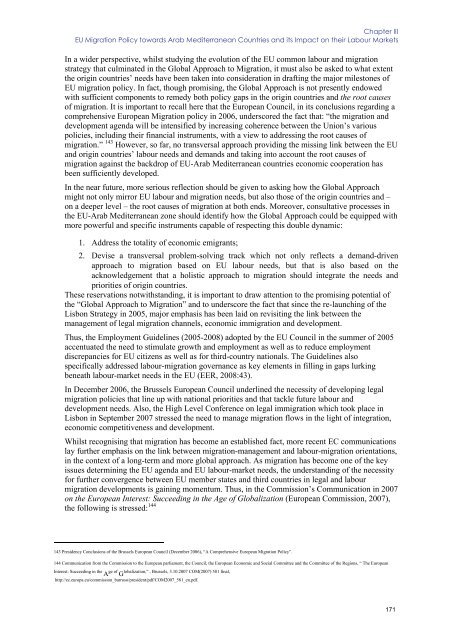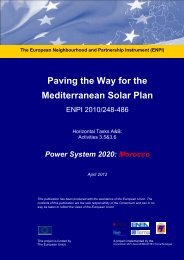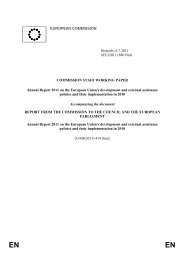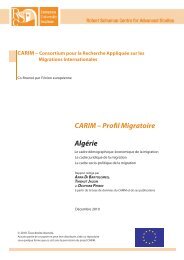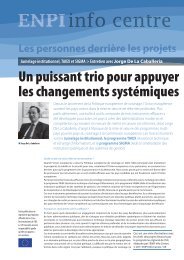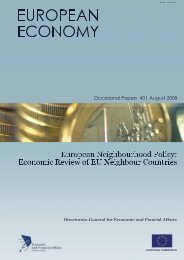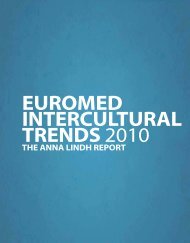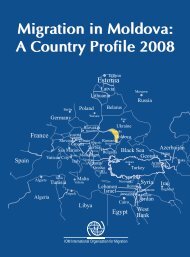<strong>European</strong> CommissionOccasional Paper 60, Volume Ilegislative measures related to economic migrants 139 such as the conditions of entry <strong>and</strong> residenceof economic migrants. More specifically, it puts forward five legislative proposals on economicim<strong>migration</strong> <strong>and</strong> divides economic migrants into four categories: highly qualified workers, seasonalworkers, remunerated trainees <strong>and</strong> intra-corporate transferees. It also encourages circular <strong>migration</strong>as a strategy that responds to “labour needs in Member States while contributing, through eventualreturn, to the development of countries of origin <strong>and</strong> offering skills <strong>and</strong> other gains to participatingmigrants.” 140On the other h<strong>and</strong>, there is increasingly a sense that a common EU <strong>migration</strong> policy mustencompass the needs of origin countries <strong>and</strong> should resort to new cooperative mechanisms whichare founded more on a global than on a solely EU-based approach. 141 This is why the GlobalApproach to Migration in December 2005 highlights the need for a multilateral path as <strong>migration</strong>patterns have defied geographical <strong>and</strong> narrow institutional arrangements. The document drawsattention to “how best to share information on legal <strong>migration</strong> <strong>and</strong> labour-<strong>market</strong> opportunities”. 142However, it is disputable on which grounds this approach is “global”: in its geographic scope, or inthe sense that it intends to take into consideration the interests of all parties or all the stages of the<strong>migration</strong> process, including the root causes of <strong>migration</strong>? If this is the case, <strong>and</strong>, however,enlightened this approach may be, concrete instruments that encompass these objectives areprecariously defined <strong>and</strong> are at least partially missing. In the following paragraphs, the mainshortcomings of the Global Approach as a framework that could provide an adequate platform forthe Euro-Arab Mediterranean zone will be briefly outlined. This critical appraisal is very importantinasmuch as it allows us to ascertain why this approach needs to be refined in helping managelabour <strong>and</strong> <strong>migration</strong> exigencies.Upon analyzing the 2005 approach to <strong>migration</strong> which puts forward legislative proposals revolvingaround four categories of economic migrants (highly-qualified workers, seasonal workers,remunerated trainees <strong>and</strong> intra-corporate transferees), one is first inclined to inquire whether theGlobal Approach to Migration only partially addresses economic migrants’ profile <strong>and</strong> <strong>flows</strong>, <strong>and</strong>whether it would really be able to lay the foundations for a holistic approach dealing with alleconomic emigrants, including those low <strong>and</strong> the medium-skilled who are not seasonal workers. Itis clear that the inherent tensions at the EU level, <strong>and</strong> more precisely, the tensions between the EUCommission <strong>and</strong> the EU member states, partly explain <strong>and</strong> justify the incompleteness of theapproach. Still, it is striking that the approach as it has been defined to date cannot provide acomprehensive mechanism that responds to all <strong>migration</strong> imperatives <strong>and</strong> realities in the Euro-ArabMediterranean zone.http://eur-lex.europa.eu/LexUriServ/site/en/com/2005/com2005_0669en01.pdf.139 This communication envisaged, for the period from 2007 to 2009, the adoption of four specific directives on labour im<strong>migration</strong> which tackle simplified admission procedures <strong>and</strong>conditions for certain categories of migrants: highly skilled migrants, seasonal migrants, remunerated trainees <strong>and</strong> intra-corporate transferees.140 <strong>European</strong> Commission, “Policy Plan on Legal Migration” {SEC(2005)1680,http://eur-lex.europa.eu/LexUriServ/site/en/com/2005/com2005_0669en01.pdf., p. 24.141 This approach draws upon the importance of developing a global approach that would highlight cooperation among regions. See Antoine Pecoud <strong>and</strong> Paul de Guchteneire,“Introduction: the Migration without Borders Scenario,” , p. 25 in Migration without Borders: Essays on the Free Movement of People, (UNESCO-Bergahn books).142 See “Global Approach to Migration: Priority Actions Focusing on Africa <strong>and</strong> the Mediterranean”, http://register.consilium.eu.int/pdf/en/05/st15/st15744.en05.pdf.170
Chapter IIIEU Migration Policy towards Arab Mediterranean Countries <strong>and</strong> its Impact on their <strong>Labour</strong> MarketsIn a wider perspective, whilst studying the evolution of the EU common labour <strong>and</strong> <strong>migration</strong>strategy that culminated in the Global Approach to Migration, it must also be asked to what extentthe origin countries’ needs have been taken into consideration in drafting the major milestones ofEU <strong>migration</strong> policy. In fact, though promising, the Global Approach is not presently endowedwith sufficient components to remedy both policy gaps in the origin countries <strong>and</strong> the root causesof <strong>migration</strong>. It is important to recall here that the <strong>European</strong> Council, in its conclusions regarding acomprehensive <strong>European</strong> Migration policy in 2006, underscored the fact that: “the <strong>migration</strong> <strong>and</strong>development agenda will be intensified by increasing coherence between the Union’s variouspolicies, including their financial instruments, with a view to addressing the root causes of<strong>migration</strong>.” 143 However, so far, no transversal approach providing the missing link between the EU<strong>and</strong> origin countries’ labour needs <strong>and</strong> dem<strong>and</strong>s <strong>and</strong> taking into account the root causes of<strong>migration</strong> against the backdrop of EU-Arab Mediterranean countries economic cooperation hasbeen sufficiently developed.In the near future, more serious reflection should be given to asking how the Global Approachmight not only mirror EU labour <strong>and</strong> <strong>migration</strong> needs, but also those of the origin countries <strong>and</strong> –on a deeper level – the root causes of <strong>migration</strong> at both ends. Moreover, consultative processes inthe EU-Arab Mediterranean zone should identify how the Global Approach could be equipped withmore powerful <strong>and</strong> specific instruments capable of respecting this double dynamic:1. Address the totality of economic emigrants;2. Devise a transversal problem-solving track which not only reflects a dem<strong>and</strong>-drivenapproach to <strong>migration</strong> based on EU labour needs, but that is also based on theacknowledgement that a holistic approach to <strong>migration</strong> should integrate the needs <strong>and</strong>priorities of origin countries.These reservations notwithst<strong>and</strong>ing, it is important to draw attention to the promising potential ofthe “Global Approach to Migration” <strong>and</strong> to underscore the fact that since the re-launching of theLisbon Strategy in 2005, major emphasis has been laid on revisiting the link between themanagement of legal <strong>migration</strong> channels, economic im<strong>migration</strong> <strong>and</strong> development.Thus, the Employment Guidelines (2005-2008) adopted by the EU Council in the summer of 2005accentuated the need to stimulate growth <strong>and</strong> employment as well as to reduce employmentdiscrepancies for EU citizens as well as for third-country nationals. The Guidelines alsospecifically addressed labour-<strong>migration</strong> governance as key elements in filling in gaps lurkingbeneath labour-<strong>market</strong> needs in the EU (EER, 2008:43).In December 2006, the Brussels <strong>European</strong> Council underlined the necessity of developing legal<strong>migration</strong> policies that line up with national priorities <strong>and</strong> that tackle future labour <strong>and</strong>development needs. Also, the High Level Conference on legal im<strong>migration</strong> which took place inLisbon in September 2007 stressed the need to manage <strong>migration</strong> <strong>flows</strong> in the light of integration,economic competitiveness <strong>and</strong> development.Whilst recognising that <strong>migration</strong> has become an established fact, more recent EC communicationslay further emphasis on the link between <strong>migration</strong>-management <strong>and</strong> labour-<strong>migration</strong> orientations,in the context of a long-term <strong>and</strong> more global approach. As <strong>migration</strong> has become one of the keyissues determining the EU agenda <strong>and</strong> EU labour-<strong>market</strong> needs, the underst<strong>and</strong>ing of the necessityfor further convergence between EU member states <strong>and</strong> third countries in legal <strong>and</strong> labour<strong>migration</strong> developments is gaining momentum. Thus, in the Commission’s Communication in 2007on the <strong>European</strong> Interest: Succeeding in the Age of Globalization (<strong>European</strong> Commission, 2007),the following is stressed: 144143 Presidency Conclusions of the Brussels <strong>European</strong> Council (December 2006), “A Comprehensive <strong>European</strong> Migration Policy”.144 Communication from the Commission to the <strong>European</strong> parliament, the Council, the <strong>European</strong> Economic <strong>and</strong> Social Committee <strong>and</strong> the Committee of the Regions, “ The <strong>European</strong>Interest: Succeeding in theA ge of Globalization,” , Brussels, 3.10.2007 COM(2007) 581 final,http://ec.europa.eu/commission_barroso/president/pdf/COM2007_581_en.pdf.171
- Page 5 and 6:
STUDYLABOUR MARKETS PERFORMANCE AND
- Page 7 and 8:
Table of ContentsLABOUR MARKETS PER
- Page 10:
8.1 Actual migration and consumptio
- Page 15 and 16:
Chapter IFinal Report 15 MILLION NE
- Page 17 and 18:
Chapter IFinal Report …so that MI
- Page 19 and 20:
Chapter IFinal Reportroots). The cu
- Page 21 and 22:
Chapter IFinal Report In AMCs, REMI
- Page 23 and 24:
Chapter IFinal Reportpolicies. This
- Page 25 and 26:
Chapter IFinal ReportMediterranean
- Page 27 and 28:
Chapter IFinal ReportMore recently,
- Page 29 and 30:
Chapter IFinal Reportfor EU employm
- Page 31 and 32:
Chapter IFinal Reportchosen, these
- Page 33 and 34:
Chapter IFinal Reportexit of women
- Page 35 and 36:
Chapter IFinal ReportFigure 1.2.1.
- Page 37 and 38:
Chapter IFinal ReportA Declining Em
- Page 39 and 40:
Chapter IFinal ReportThe same year,
- Page 41 and 42:
Chapter IFinal ReportTable 2.2.1. I
- Page 43 and 44:
Chapter IFinal Reportminimum wages
- Page 45 and 46:
Chapter IFinal Report2.4 Unemployme
- Page 47 and 48:
Chapter IFinal ReportYouth Unemploy
- Page 49 and 50:
Chapter IFinal ReportBut one should
- Page 51 and 52:
Chapter IFinal Reportmillion) 10 .
- Page 53 and 54:
Chapter IFinal Reportmight intensif
- Page 55 and 56:
Chapter IFinal Reporttrue labour ma
- Page 57 and 58:
Chapter IFinal Reportto reform the
- Page 59 and 60:
Chapter IFinal ReportFrom a differe
- Page 61 and 62:
Chapter IFinal ReportTable 4.2.1 Ou
- Page 63 and 64:
Chapter IFinal ReportSource: Adams
- Page 65 and 66:
Chapter IFinal Reportin the destina
- Page 67 and 68:
Chapter IFinal ReportIn conclusion,
- Page 69 and 70:
Chapter IFinal Reportorganised in B
- Page 71 and 72:
Chapter IFinal Reportsecond Intifad
- Page 73 and 74:
Chapter IFinal Reportstands at 29.7
- Page 75 and 76:
Chapter IFinal Reportconstruction w
- Page 77 and 78:
Chapter IFinal ReportAs far as the
- Page 79 and 80:
Chapter IFinal Reportother cases, l
- Page 81 and 82:
Chapter IFinal Reportunemployment a
- Page 83 and 84:
Chapter IFinal Reportof Egypt, so f
- Page 85 and 86:
Chapter IFinal ReportWhile progress
- Page 87 and 88:
Chapter IFinal ReportThese reservat
- Page 89 and 90:
Chapter IFinal ReportAs Figure 6.3.
- Page 91 and 92:
Chapter IFinal Reportin skill devel
- Page 93 and 94:
Chapter IFinal ReportThe Directive
- Page 95 and 96:
Chapter IFinal ReportThe need for
- Page 97 and 98:
Chapter IFinal Reportobjectives are
- Page 99 and 100:
Chapter IFinal Reporttrue Euro-Medi
- Page 101 and 102:
Chapter IFinal Report- Putting empl
- Page 103 and 104:
Chapter IFinal Report promotion of
- Page 105 and 106:
Chapter IFinal ReportOtherADAMS, R.
- Page 107 and 108:
Chapter IFinal ReportDE BEL-AIR, F.
- Page 109 and 110:
Chapter IFinal ReportGUPTA, S., C.
- Page 111 and 112:
Chapter IFinal ReportOECD (2000): M
- Page 113 and 114:
Chapter II - Thematic Background Pa
- Page 115 and 116:
Chapter IIThe impact of migration o
- Page 117 and 118:
Chapter IIThe impact of migration o
- Page 119 and 120:
Chapter IIThe impact of migration o
- Page 121 and 122: Chapter IIThe impact of migration o
- Page 123 and 124: Chapter IIThe impact of migration o
- Page 125 and 126: Chapter IIThe impact of migration o
- Page 127 and 128: Chapter IIThe impact of migration o
- Page 129 and 130: Chapter IIThe impact of migration o
- Page 131 and 132: Chapter IIThe impact of migration o
- Page 133 and 134: Chapter IIThe impact of migration o
- Page 135 and 136: Chapter IIThe impact of migration o
- Page 137 and 138: Chapter IIThe impact of migration o
- Page 139 and 140: Chapter IIThe impact of migration o
- Page 141 and 142: Chapter IIThe impact of migration o
- Page 143 and 144: Chapter IIThe impact of migration o
- Page 145 and 146: Chapter IIThe impact of migration o
- Page 147 and 148: Chapter IIThe impact of migration o
- Page 149 and 150: Chapter IIThe impact of migration o
- Page 151 and 152: Chapter IIThe impact of migration o
- Page 153 and 154: Chapter IIThe impact of migration o
- Page 155 and 156: Chapter IIThe impact of migration o
- Page 157 and 158: Chapter IIThe impact of migration o
- Page 159 and 160: Chapter IIThe impact of migration o
- Page 161 and 162: Chapter III - Thematic Background P
- Page 163 and 164: Chapter IIIEU Migration Policy towa
- Page 165 and 166: Chapter IIIEU Migration Policy towa
- Page 167 and 168: Chapter IIIEU Migration Policy towa
- Page 169 and 170: Chapter IIIEU Migration Policy towa
- Page 171: Chapter IIIEU Migration Policy towa
- Page 175 and 176: Chapter IIIEU Migration Policy towa
- Page 177 and 178: Chapter IIIEU Migration Policy towa
- Page 179 and 180: Chapter IIIEU Migration Policy towa
- Page 181 and 182: Chapter IIIEU Migration Policy towa
- Page 183 and 184: Chapter IIIEU Migration Policy towa
- Page 185 and 186: Chapter IIIEU Migration Policy towa
- Page 187 and 188: Chapter IIIEU Migration Policy towa
- Page 189 and 190: Chapter IIIEU Migration Policy towa
- Page 191 and 192: Chapter IIIEU Migration Policy towa
- Page 193 and 194: Chapter IIIEU Migration Policy towa
- Page 195 and 196: Chapter IIIEU Migration Policy towa
- Page 197 and 198: Chapter IIIEU Migration Policy towa
- Page 199 and 200: Chapter IIIEU Migration Policy towa
- Page 201 and 202: Chapter IIIEU Migration Policy towa
- Page 203 and 204: Chapter IIIEU Migration Policy towa
- Page 205 and 206: Chapter IIIEU Migration Policy towa
- Page 207: Chapter IIIEU Migration Policy towa


